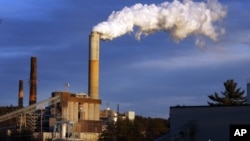Some big American coal companies have advised President Donald Trump's administration to break his promise to pull the United States out of the Paris Climate Agreement -- arguing that the accord could provide their best forum for protecting their global interests.
Remaining in the global deal to combat climate change will give U.S. negotiators a chance to advocate for coal in the future of the global energy mix, coal companies like Cloud Peak Energy and Peabody Energy told White House officials over the past few weeks, according to executives and a U.S. official familiar with the discussions.
"The future is foreign markets, so the last thing you want to do if you are a coal company is to give up a U.S. seat in the international climate discussions and let the Europeans control the agenda," said the official, who asked not to be named because he was not authorized to speak publicly on the issue.
"They can't afford for the most powerful advocate for fossil fuels to be away from the table," the official said.
Cloud Peak and Peabody officials confirmed the discussions.
'Path forward'
In Cloud Peak's view, staying in the agreement and trying to encourage "a more balanced, reasonable and appropriate path forward" on fossil fuel technologies among signatories to the accord seems like a reasonable stance, said Richard Reavey, Cloud Peak's vice president of government affairs.
The coal industry was interested in ensuring that the Paris deal provides a role for low-emission coal-fired power plants and financial support for carbon capture and storage technology, the officials said. They also want the pact to protect multilateral funding for international coal projects through bodies like the World Bank.
The Paris accord, agreed by nearly 200 countries in 2015, would seek to limit global warming by slashing carbon dioxide and other emissions from burning fossil fuels. As part of the deal, the United States committed to reducing its emissions by between 26 percent and 28 percent below 2005 levels by 2025.
During his 2016 presidential campaign, Trump vowed to pull the United States out of the pact, tapping into a well of concern among his fellow Republicans that the United States' energy habits would be policed by the United Nations.
Seeking companies' advice
But since being elected, he has been mostly quiet on the issue, and administration officials have recently been asking energy companies for advice.
White House spokesman Sean Spicer said last week that the administration expected to make a decision on whether to remain a party to the deal by the time leaders of the Group of Seven wealthy nations meet in late May.
The prospect of the United States remaining in the Paris deal has irritated some smaller miners, including Murray Energy Corp, whose chief executive, Robert Murray helped fund Trump's presidential bid.
Staying in the Paris accord could also face resistance from within Trump's party. Republican Congressman Kevin Cramer of North Dakota has been circulating a letter among Republican lawmakers calling on the president to stay in the deal but has gathered only seven signatures so far.





